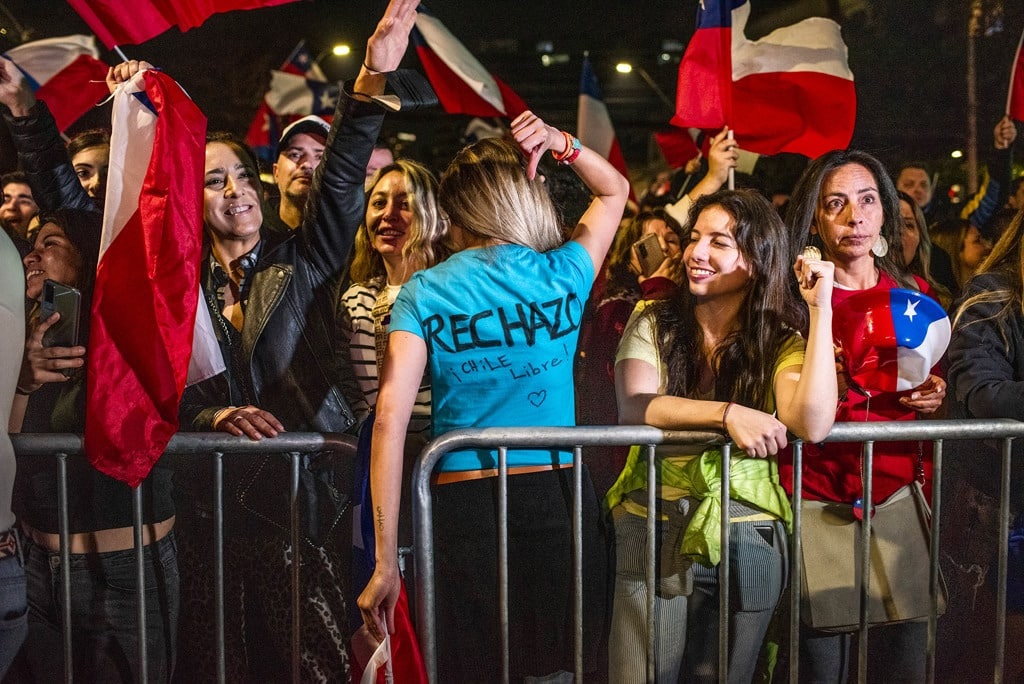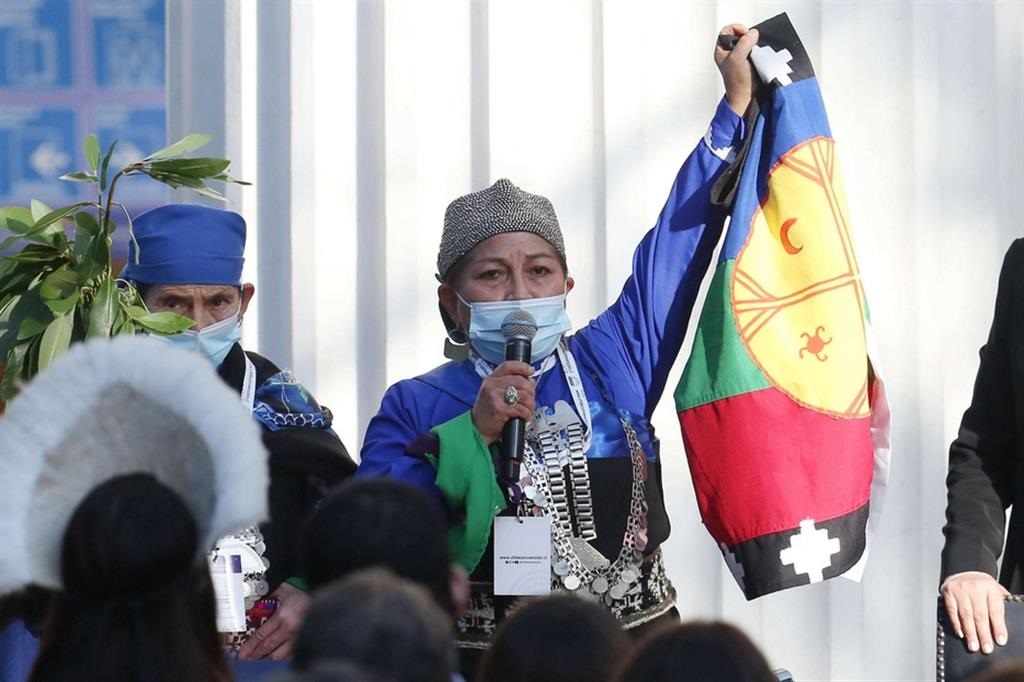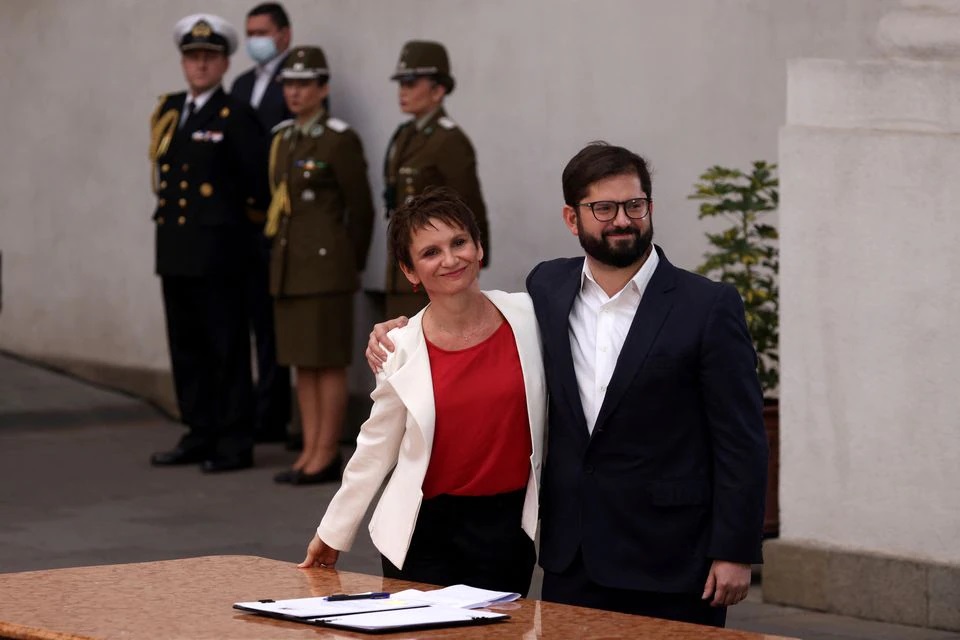
Only 9 months after choosing Gabriel Boric as the country’s new leader[1], Chilean voters overwhelmingly rejected the new constitution proposed by the Assembly[2], which was supposed to replace the one drafted under the military government of General Augusto Pinochet in 1980. Despite the fact that Chileans have been demanding for years that the dictatorial laws of half a century ago be cancelled (in October 2020, after mass protests, 78% of the population voted to change them[3]), 62% of the electorate voted against[4]. The president of Colombia, Gustavo Petro, commented: ‘Pinochet has been resurrected’[5]. And now Chile is on the brink of chaos, and Boric’s government is contemplating resignation. He entered the Moneda on 11 March with an ambitious programme of health, education, social security and tax reforms[6]. A programme whose premise was the referendum rejected by those who had elected him.
What the new Constitution proposed

Thousands in Santiago streets to celebrate referendum defeat[7]
The process that led to the drafting of the Constitution, which lasted a year, was very participative: it took in various civic proposals and involved, in fact, more than one and a half million Chileans, who wrote proposals and presented petitions that were then collected by the Assembly in the referendum draft. For this reason, the new Constitution was defined by the national press as ‘popular’, that is, written ‘from below’[8]. It integrates the rights of minority ethnic groups (first and foremost the Mapuche, who make up 21% of the population), enhances the visibility and role of women in society, and opens up wide spaces for State intervention in the economy and in public and social services (schools, pensions, health, culture)[9].
The new charter delegates many powers to the state in terms of the provision of various services and extends the protection of social rights, particularly in health, education and housing policies. It strengthens the rights of working men and women, guarantees the right to strike and recognises the ‘social function of work’. It also recognises and defends the commons: it enshrines the universal right to water, which as a common good cannot be privatised, and the right of nature to be protected and respected[10]. The draft, now rejected, would also have changed many Chilean institutions, such as the replacement of the Senate with a Chamber of Regions, the first step in the modification of the unitary state into a federal one, which would better guarantee the areas furthest from the capital[11].
The Constitution is also feminist: the text enshrines gender equality in public and private institutions, recognises home support work as a job, creates the right to abortion and promotes the abolition of wage inequality. A number of articles deal with gender violence and the recognition of a gender perspective in health and justice[12]. So why it was rejected by Chileans, then?
The main mistake was that they wanted to do too much: after eighteen months of debates, often confused, an extremely complex and lengthy text of 178 pages and 388 articles with 38 transitional rules was produced[13] (a bit too many, compared to the existing one of 143 articles, and the Italian one of 139[14]). A constitution should lay down the essentials, not the political line of the next generation – moreover, in a country that is still very conservative[15]. The project is also criticised by the Instituto Liberdad y Desarollo, according to which the government’s proposal weakens public-private partnerships and compromises the welfare of citizens[16].
With the creation of several parallel judicial systems, without clearly defined jurisdictional limits, there is a risk of serious inequalities and arbitrary discrimination[17]. If Chile, historically, is a unitary and centralist state, the new text recognises multiple nations[18]: “Chile is a social and democratic state, founded on the rule of law. It is plurinational, intercultural, regional and ecological‘[19]. And it places the rights of women, ethnic groups, flora and fauna on the same level, in an enormous confusion of priorities and directions[20]. The election campaign was characterised by a wide spread of fake news, especially on social networks. One of the most circulated was that the new Constitution did not defend private ownership of homes. The ‘yes’ front had to speak out publicly to refute this nonsense, as well as the one according to which abortion would be allowed up to the ninth month of pregnancy[21].

Elisa Loncón waves the flag of the Mapuche people after her election[22]
The new Chilean proposal would like to unite the country, but only risks dividing it, especially when it recites that it wants to return land usurped over generations to ethnic minorities[23], a proposal that has deeply upset the people, because it calls into question their acquired property rights. The proposal was inserted by Elisa Loncón[24], a Mapuche woman elected to the President of the Assembly in July 2021[25]. To date, the Chilean constitution is the only one in Latin America that does not recognise the indigenous peoples, of which there are at least nine in Chile, the majority being the Mapuche (literally ‘people of the land’, 1.7 million citizens out of 19 million Chileans[26]) and the Aymara[27]. And Gabriel Boric had promised them that he would make radical decisions – which make the minority ethnic groups happy, but frighten over 80% of the population.
The timing is not the most propitious: the president has to deal with the economic crisis caused by the pandemic, the petrol crisis caused by the war in Ukraine, the migratory pressure in the north of the country, which has given rise to racist and xenophobic episodes, especially in the city of Iquique and the southern region of Araucanía. Not forgetting issues related to human rights violations committed during the 2019 protests by the carabineros police force, whose structural reform many Boric voters were calling for. Voters of the new government expected first of all a solution to the country’s deep inequalities and the nationalisation of health, education and the social security system, now in private hands[28].
What now?

Celebrating citizens after the ‘rechazo’ (the ‘no’ to the referendum)[29]
After the announcement of the results, hundreds of people who had voted ‘no’ gathered in the capital Santiago at Plaza Baquedano (which during the large protests that began in October 2019 the protesters had nicknamed Plaza de la Dignidad), and celebrated, mostly peacefully: a few agitators pelted cars passing in the streets near the square with stones and sticks, and were later stopped by the police[30]. The result was celebrated by the No Committee as a ‘gesture of wisdom on the part of the Chileans‘ and as ‘a resounding lesson for the more radical leftist and communist wing‘ that supported the new Constitution[31].
But only now is it clear to everyone that the NO vote has cancelled everything, so Chilean students are protesting in the capital’s metro stations, demanding reforms to the education system[32]. The president, who had supported the new constitution, says he will work with Congress and civil society to draw up a ‘new constitutional process’[33]: “we must listen to the voice of the people“, he confirms. Boric says he will continue to work towards a proposal that ‘fills us with confidence and unites us all’[34].
The country is suffering from drought and water rationing[35]. On 1 May, there were demonstrations against the difficult situation in the country: capitalism that does not solve, patronage abuses and the disparity of economic growth: the country’s few wealthy families doubled their profits in 2021, while the increase in real wages did not go beyond 5.2 per cent. This has not compensated for the increase in inflation, which has meant a real loss of purchasing power of Chilean wages[36]: ‘from December 2021 to March 2022, the loss of purchasing power of wages increased to almost $100,000 pesos per month in relation to the increase in prices of essential foods such as bread, vegetables, pulses, oil and dairy products and basic services (…) such as gas, petrol and paraffin, which increased by 55.6%’, denounces the Central Clasista de los Trabajadores[37]. There are fierce clashes with the police.
And now Chileans are demanding the changes contained in the referendum: fair pensions, decent jobs, public health and free education[38]. Therefore, after the rejection of the constitution Gabriel Boric gathered the party leaders[39], and ‘reshuffled’ the government, creating a new staff to write a proposal for a new constitution that has the support of all political forces[40]. Boric appointed Carolina Toha as Minister of the Interior: an experienced centrist politician, former mayor of Santiago and minister under former President Michelle Bachelet[41].
But it will not be easy to start again after the hardships and tensions of recent years. An alternative route could be for a smaller commission of politicians and academics to work on a new text. In the meantime, the right-wing camp has said it is open to changes to the constitution, suggesting a downsizing of the goals of the left that won the elections[42]. Says Boric: ‘from a political point of view, it is perhaps one of the most difficult moments I have had to face’. He calls for ‘overcoming differences’, ‘strengthening cohesion’ and ‘regaining the trust’ of Chileans[43]. But he slams against a wall formed by the conservative attitude of the vast majority of the population, who had voted him in to get the neo-liberal right out of Moneda, but who don’t really want to know about Boric’s (and Salvador Allende’s) social policies. Chile is no longer that of the working class of the 1970s.

6 September 2022: Chilean President Gabriel Boric with the new Interior Minister Carolina Toha[44]
Even in Latin America, the sense of solidarity that dominated the post-World War II years has been replaced by an individualism that sometimes borders on sociopathy. This is not to say that the referendum was right, but only that, in order to achieve change, Boric tried to fill it with all the particular demands of all the interest and pressure groups, without caring about contradictions, excessive complexity, and the bureaucratisation of sociality – an idea that has never worked, except in a negative sense, as in 1930s Germany or present-day Russia: people unite more willingly against an enemy than in favour of an idea.
In the last century, defeat would have forced Boric to resign. In this sense, Chile proves to be a part of the Western political world: in Santiago, as in Rome, Berlin, London and Stockholm, the opposition parties do not take advantage of the rising tide against the majority ones, because they do not want the responsibility of managing the disaster that we all imagine to be imminent and of which there are so many signs – just follow the selected news reports, from the danger of the Ukrainian nuclear power plant explosion to the wheat crisis, from the inflationary explosion of energy costs to the growth of racist sentiments, everywhere.
When people demand change, they want it radical and immediate, but they demand it painless. Boric’s referendum tried to find a highest common denominator of all Chileans, and came up against the lowest common multiple of anger and rejection of novelty. After a century of lies about democracy, propagated by industrial, financial and now military capitalism – at first only by the United States, today also by China and Russia – social coexistence is sorely tested, and it only takes a trifle to set off violence in the streets.
The resolution of the Chilean issue, whatever it may be, will serve us to understand what challenges our national parliaments will face in the coming months. And, I assure you, there is cause to be scared to death.
[1] https://www.glistatigenerali.com/geopolitica/il-cile-di-gabriel-boric-il-ritorno-della-speranza/
[2] Constituent Convention consists of 155 members. Men and women in equal numbers plus 17 members from the country’s original populations, particularly Mapuche and Aymara: https://www.avvenire.it/mondo/pagine/mapuche-presidente-loncon
[3] https://www.bbc.com/news/world-latin-america-54687090
[4] https://www.ilmattino.it/primopiano/esteri/cile_costituzione_pinochet_referendum_manifestazioni_ultime_notizie-6909635.html
[5] https://twitter.com/petrogustavo/status/1566573956915728384
[6] https://www.internazionale.it/magazine/2022/03/17/le-prime-mosse-di-gabriel-boric
[7] https://www.ilmattino.it/primopiano/esteri/cile_costituzione_pinochet_referendum_manifestazioni_ultime_notizie-6909635.html
[8] https://www.ilpost.it/2022/09/04/cile-costituzione-referendum/
[9] https://www.ansa.it/sito/notizie/mondo/2022/09/04/cile-aperti-i-seggi-per-il-referendum-sulla-nuova-costituzione_898cc558-d046-43a9-842c-688ef0740854.html
[10] https://www.ilpost.it/2022/09/04/cile-costituzione-referendum/
[11] https://www.chileconvencion.cl/wp-content/uploads/2022/07/Texto-CPR-2022.pdf
[12] https://www.ilpost.it/2022/09/04/cile-costituzione-referendum/
[13] Il testo completo della nuova Costituzione si può consultare qui: https://www.chileconvencion.cl/wp-content/uploads/2022/07/Texto-CPR-2022.pdf
[14] https://www.glistatigenerali.com/america-mondo_legislazione/voto-cile-referendum-costituzionale-4-settembre/
[15] https://www.ilpost.it/2022/09/06/bocciatura-costituzione-blocca-rinnovamento-cile/
[16] https://lyd.org/centro-de-prensa/noticias/2022/08/7-puntos-criticos-que-evidencian-que-la-propuesta-constitucional-debilita-las-alianzas-publico-privadas-y-con-ello-compromete-el-bienestar-de-la-ciudadania/ ; https://lyd.org/centro-de-prensa/noticias/2022/08/6-puntos-criticos-de-los-principios-constitucionales-en-la-propuesta-de-nueva-constitucion/
[17] https://www.glistatigenerali.com/america-mondo_legislazione/voto-cile-referendum-costituzionale-4-settembre/
[18] https://www.ilpost.it/2022/09/04/cile-costituzione-referendum/
[19] https://www.chileconvencion.cl/wp-content/uploads/2022/07/Texto-CPR-2022.pdf , pag. 5
[20] https://www.internazionale.it/opinione/pierre-haski/2022/09/05/referendum-cile-costituzione
[21] https://www.ilpost.it/2022/09/06/bocciatura-costituzione-blocca-rinnovamento-cile/
[22] https://www.avvenire.it/mondo/pagine/mapuche-presidente-loncon
[23] https://www.internazionale.it/opinione/pierre-haski/2022/09/05/referendum-cile-costituzione
[24] Official web-site: https://elisaloncon.cl/
[25] https://www.avvenire.it/mondo/pagine/mapuche-presidente-loncon
[26] https://www.internazionale.it/reportage/flora-genoux/2022/05/10/cile-mapuche
[27] https://www.avvenire.it/mondo/pagine/mapuche-presidente-loncon
[28] https://www.internazionale.it/opinione/camilla-desideri/2022/03/11/cile-gabriel-boric
[29] https://www.ansa.it/sito/notizie/topnews/2022/09/05/no-dei-cileni-alla-nuova-costituzione-boric-in-emergenza_ee6ff596-7c5a-4b4e-ba46-d3f2e69b3f71.html
[30] https://www.ilpost.it/2022/09/05/cile-costituzione-bocciata/
[31] https://www.ansa.it/sito/notizie/topnews/2022/09/05/no-dei-cileni-alla-nuova-costituzione-boric-in-emergenza_ee6ff596-7c5a-4b4e-ba46-d3f2e69b3f71.html
[32] https://www.reuters.com/world/americas/chile-students-disrupt-metro-with-protests-wake-constitution-defeat-2022-09-07/
[33] https://www.reuters.com/world/americas/chile-forced-back-drawing-board-after-new-constitution-scuttled-2022-09-05/
[34] https://www.bbc.com/news/world-latin-america-62792025
[35] https://www.ilpost.it/2022/04/13/santiago-cile-razionamento-acqua-siccita-cambiamento-climatico/
[36] https://www.glistatigenerali.com/america-mondo_sindacati/scontri-durante-le-manifestazioni-del-1-maggio-in-un-cile-sempre-piu-diviso/
[37] https://www.glistatigenerali.com/america-mondo_sindacati/scontri-durante-le-manifestazioni-del-1-maggio-in-un-cile-sempre-piu-diviso/
[38] https://www.glistatigenerali.com/america-mondo_sindacati/scontri-durante-le-manifestazioni-del-1-maggio-in-un-cile-sempre-piu-diviso/
[39] https://www.ansa.it/sito/notizie/mondo/americalatina/2022/09/05/no-dei-cileni-alla-nuova-costituzione-boric-in-emergenza_423d9103-356b-422c-baf3-326efbb7b500.html ; https://www.interris.it/attualita/no-cileni-nuova-costituzione-presidente-boric-convoca-partiti/
[40] https://www.ilpost.it/2022/09/07/cile-rimpasto-governo-costituzione-bocciata-boric/
[41] https://www.reuters.com/world/americas/urgent-chiles-boric-reshapes-cabinet-after-voters-reject-new-constitution-2022-09-06/
[42] https://www.ilpost.it/2022/09/06/bocciatura-costituzione-blocca-rinnovamento-cile/
[43] https://www.lemonde.fr/en/international/article/2022/09/07/government-reshuffle-after-chile-votes-no-in-constitution-referendum_5996117_4.html
[44] https://www.reuters.com/world/americas/urgent-chiles-boric-reshapes-cabinet-after-voters-reject-new-constitution-2022-09-06/
Leave a Reply